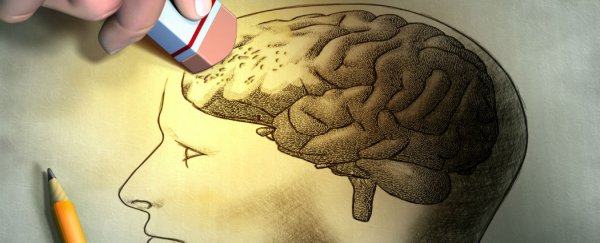The human body has a finite amount of resources, and scientists are always discovering more about how these resources are shared, depleted, and replenished. Now a new study suggests that the areas in your brain responsible for self-control and forming memories are closely linked - in other words, if you're concentrating hard on staying disciplined, you're probably becoming less adept at remembering what's happening.
Researchers Yu-Chin Chiu and Tobias Egner from Duke University in the US asked a group of volunteers to recognise a series of faces, both with and without the inclusion of a self-control test in the middle. They found that having to exercise self-control had a negative impact on the participants' ability to recall which pictures they'd previously seen. The same experiment was then repeated with a new set of volunteers and brain-scanning fMRI (functional magnetic resonance imaging) equipment on hand.
The pair discovered that one area of the brain - the ventrolateral prefrontal cortex - was activated frequently during the self-control test and predicted the strength of the volunteers' memory later on. The findings suggest that self-control and memory compete for the same resources inside the brain, and support the theory that inhibiting ourselves can also cause us to forget more easily.
"The control demands of response inhibition divert attention away from stimulus encoding, thereby weakening memory traces for inhibitory cues," the researchers conclude in The Journal of Neurosience. "These findings shed new light on the relation between the control process of response inhibition and the cognitive domains of perception, attention, and memory."
The self-control test used was a traditional Go/No-Go task: these tasks work by asking participants to view a series of items and push a button only when certain criteria are met - in the case of this experiment, when the face shown is male rather than female. The theory is that those who are able to hold back from a button push when necessary are those with the strongest self-control (or "response inhibition", as neuroscientists like to call it). The participants were not told in advance that they would need to remember the faces they were shown.
"The scans revealed that responding to a cue and inhibiting a response produced overlapping activation patterns in brain regions within the right frontal and parietal lobes, a network that has previously been implicated in response inhibition," Mo Costrandi reports for The Guardian. "Crucially, 'no-go' trials produced greater activation of this network than 'Go' trials, and activity in one specific brain region (the ventrolateral prefrontal cortex) predicted the strength of the participants' memory, such that the greater the observed network activation, the more likely the participants were to forget that face later on."
The researchers admit their theory is still "speculative" for now, but if further study confirms the link, they believe their discovery could be used to treat people who have problems with self-control: those suffering from ADHD ( Attention Deficit Hyperactivity Disorder), for example, or some form of addiction.
One scenario put forward by the pair is having to suddenly cancel a lane change on the motorway because a car is already in the spot you want to move into. If they're right, the act of having to control and inhibit your actions would make it less likely that you would remember the details of the incident - such as the make and model of the car that was blocking your path.
